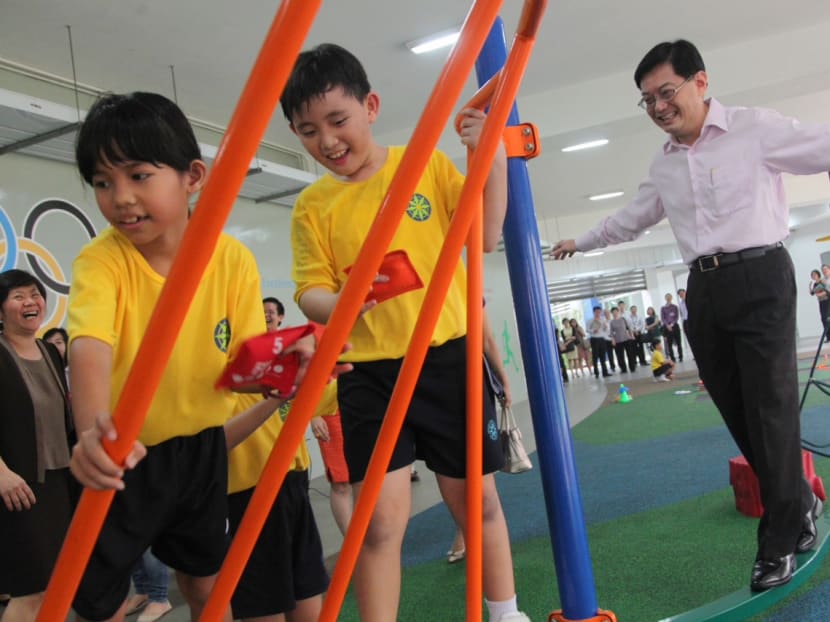Learning through play at MOE kindergartens
SINGAPORE — A curriculum with a Singaporean flavour — with an emphasis on the learning of languages and opportunities to learn through play — provided in a heartlands setting where children from various socio-economic backgrounds get to learn and play together. These will be the main ingredients that make up the Ministry of Education (MOE)’s approach to pre-school education.
SINGAPORE — A curriculum with a Singaporean flavour — with an emphasis on the learning of languages and opportunities to learn through play — provided in a heartlands setting where children from various socio-economic backgrounds get to learn and play together. These will be the main ingredients that make up the Ministry of Education (MOE)’s approach to pre-school education.
Yesterday, the MOE announced the details of its first five pilot kindergartens including their locations, the fees and its general approach.
These kindergartens will be sited at Blangah Rise Primary, Dazhong Primary, Farrer Park Primary, Punggol View Primary and at a community site in Tampines St 45 Blk 489 C.
There will be 120 places at each of the kindergartens located in primary schools, while the centre in Tampines will admit 80 places. For all the MOE kindergartens, one third of the places will be reserved for children from lower-income families.
The kindergartens will start K1 classes in January and the admissions process will begin next month.
Fees for the four-hour kindergarten programme are set at S$150 per month for Singaporeans. Children from lower-income backgrounds will receive additional subsidies.
Speaking at a press conference, Education Minister Heng Swee Keat said: “We’ll be trying out new approaches, especially in learning through purposeful play, as well as in developing new materials … We will also be paying special attention to the learning of the English language and Mother Tongue Languages.”
The MOE kindergartens will be reflective of the sector, such as having a representative mix of students and a class size of 20 children. This is to enable the ministry to use its kindergartens to hone best practices and raise overall standards of pre-school education, he said.
He added: “With these practices, we hope to distil good practices in the MOE kindergartens, as well as across the sector which we’ll then share with all pre-school operators.”
But getting a place in MOE kindergartens will not entail direct entry into Primary 1, said Mr Heng.
It is not the MOE’s intention to start the queue earlier for Pri 1 places, he stressed. Admissions into the MOE kindergartens are also not on a “first-come-first-served” basis — one-third of the places would be reserved for Singaporean children living nearby and coming from needy backgrounds.
In future, siblings of admitted preschoolers would get priority for enrolment. Should demand exceed supply, balloting would take place and priority given based on proximity.
Mr Heng said: “We want to make sure that we help these kids (from needy families) build a good foundation when they are young”.
Senior Minister of State (Education and Law) Indranee Rajah, who was also at the press conference, noted the feedback from the ongoing Our Singapore Conversation for more social mixing. Providing some spaces, instead of all, to children from underprivileged backgrounds would signal an inclusive approach and avoid branding MOE kindergartens as focusing on a particular income group, she said.
On the monthly fee, Mr Heng said it was “at a lower end of the range because we want to make sure that this is affordable to many families”.
Currently, reflecting the diverse offerings, monthly kindergarten fees range from S$85 to more than S$1,700.
The MOE has started recruiting educators and the final pool would include fresh school leavers to former primary school teachers. The majority would be diploma holders. An MOE spokesperson told TODAY between six and nine teachers would be employed for each kindergarten. She added that response has been “encouraging”, and the remuneration is based on factors such as the applicant’s experience and industry practices.
The MOE would be developing a curriculum based on the refreshed Kindergarten Curriculum Framework, which includes holistic goals and a distinct Singaporean content.
Spaces including classrooms and learning areas have been carved out at the four primary schools which would house the MOE kindergartens. New infrastructure would be built and the pre-schoolers would share existing facilities such as music rooms.
Early childhood education experts and observers TODAY spoke to generally welcomed the MOE’s approach as it makes its foray into the sector.
Lien Foundation Chief Executive Lee Poh Wah reiterated that the setting up of MOE kindergartens is a “necessary first move by the Government to build more effective levers to better control quality and influence affordability”.
National Institute of Education Assistant Professor Sirene Lim added: “From a research standpoint, there is value to having a heterogeneous mix of children rather than cater only to children from a particular stratum of our society”.
Ngee Ann Polytechnic academic Lucy Quek-Chew said that by setting up its own kindergartens, MOE would lead the way for more professional sharing. Right now, this is limited to a small circle, due to the sector’s fragmented nature, she said.







